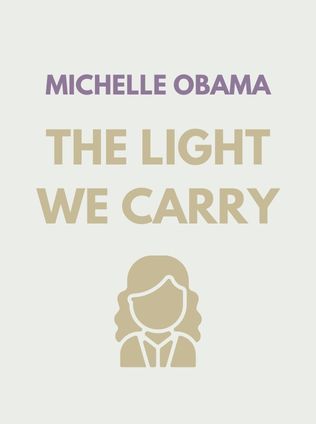
The Light We Carry
Overcoming in Uncertain Times
By Michelle Obama
Published 11/2022
About the Author
Michelle Obama, the former First Lady of the United States, is a lawyer, writer, and philanthropist. Throughout her tenure in the White House, she became an advocate for healthy living, education, and military families. Michelle Obama is not only recognized for her role alongside President Barack Obama but also for her powerful voice in advocating for women's rights and equality. Her journey from the South Side of Chicago to the White House has been an inspiration to millions. Her books, including "Becoming" and "The Light We Carry," reflect her experiences, challenges, and the wisdom she has accumulated over the years.
Main Idea
"The Light We Carry" is a guide for navigating life's uncertainties, drawing on Michelle Obama's personal experiences and insights. It emphasizes the importance of embracing one's unique abilities, strengths, and perspectives—what she refers to as "personhood." The book explores the concept that everyone has a unique light, or set of gifts, that they can use to make a positive impact on the world. Through nurturing and sharing this light, individuals can improve their mental health, create positive social change, and build strong, supportive communities.
Table of Contents
- The Power of Personhood
- Overcoming Fear
- Understanding Change
- Mental Health and Self-Care
- Building and Nurturing Relationships
- Facing Discrimination
- Turning Self-Consciousness into Empowerment
The Power of Personhood
Michelle Obama introduces the concept of "personhood," which she describes as the unique blend of abilities, strengths, and perspectives that each individual possesses. She argues that nurturing and sharing your personhood is essential for personal fulfillment and societal progress.
"Everyone has the potential to improve the world in a way others can’t since everyone has unique abilities, strengths, and perspectives." — Michelle Obama
For example, an accountant with a knack for pattern recognition may be able to prevent fraud more effectively than someone without that skill. A restaurant owner with strong social skills can create a welcoming community space that others might not be able to replicate. Obama stresses that since these potentials are unique, individuals have a responsibility to develop and utilize them for the greater good.
This chapter emphasizes the need for self-acceptance and authenticity. Living authentically, she suggests, strengthens self-worth and allows individuals to connect more deeply with others, thereby fostering empathy and compassion. This connection is the first step in building a supportive community.
Living Authentically: The Key to Self-Worth
Studies have shown that those who live authentically experience greater life satisfaction and well-being. This could be because living authentically allows people to feel less stress and shame—they no longer need to hide or downplay their true selves. Instead, they can focus their energy on nurturing their personhood and forming genuine connections with others.
Sign up for FREE and get access to 1,400+ books summaries.
You May Also Like
The Subtle Art of Not Giving a F*ck
A Counterintuitive Approach to Living a Good Life
By Mark MansonRich Dad Poor Dad
What the Rich Teach Their Kids About Money - That the Poor and Middle Class Do Not!
By Robert T. KiyosakiHow To Win Friends and Influence People
The All-Time Classic Manual Of People Skills
By Dale CarnegieFreakonomics
A Rogue Economist Explores the Hidden Side of Everything
By Steven D. Levitt and Stephen J. Dubner



















